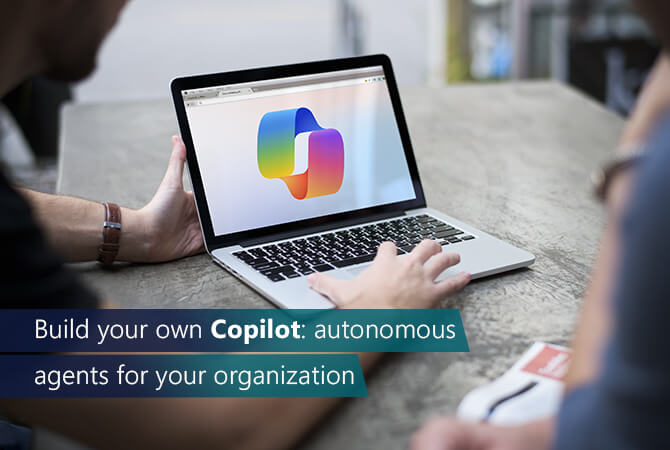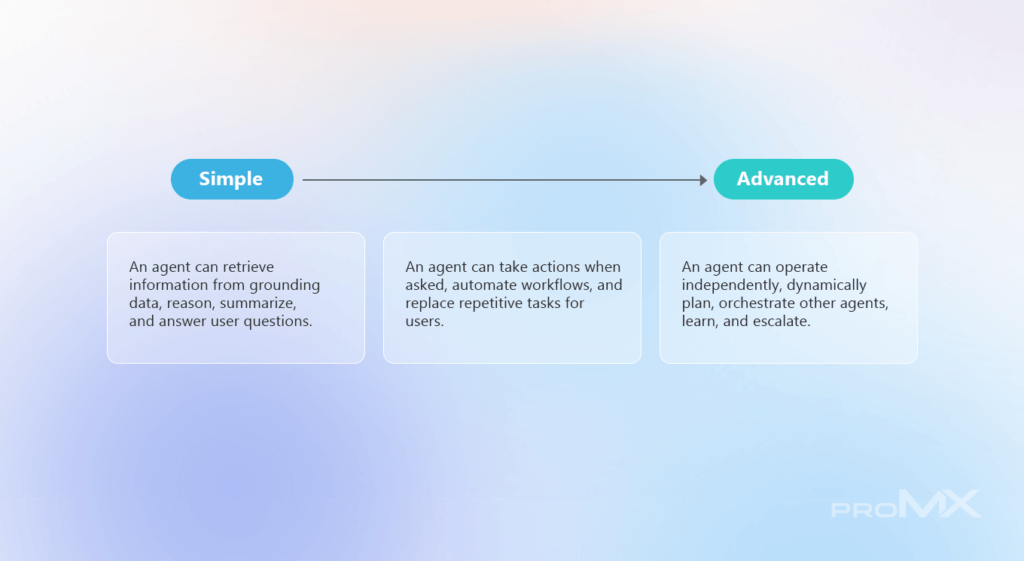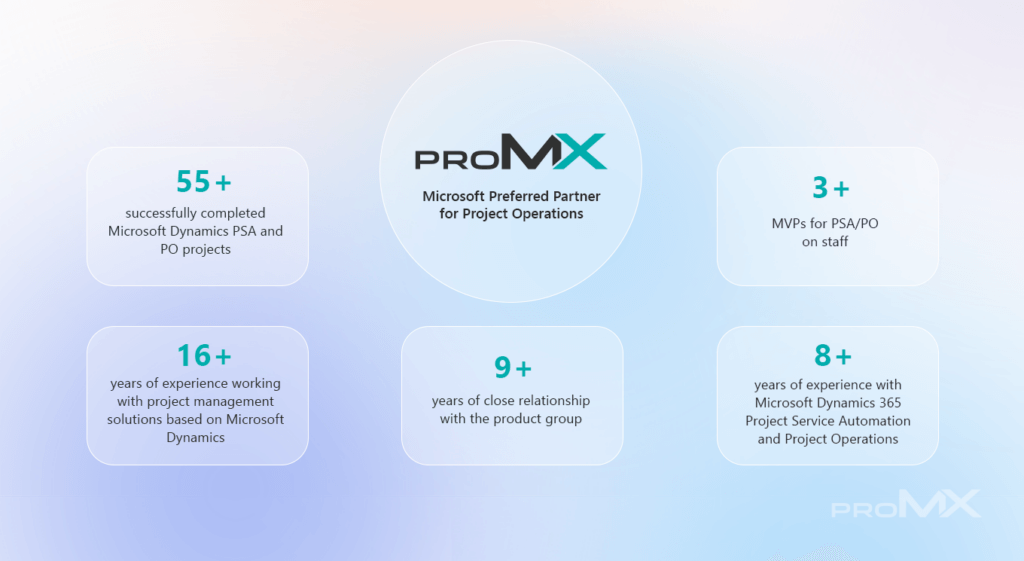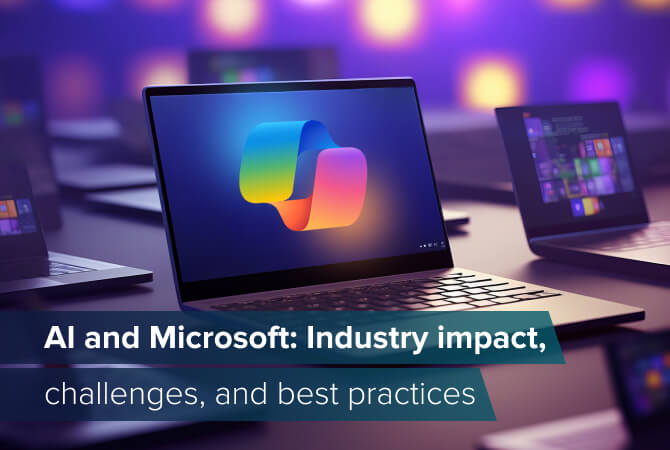
Build your own Copilot: autonomous agents for your organization
Content
The future is here. Technology is becoming more and more effortless as artificial intelligence (AI) interweaves into the very fabric of our day-to-day work:
- For every $1 invested in AI, companies are seeing an average return of $3.5. Additionally, 5% of organizations worldwide are achieving an average return of $8.
- Organizations are realizing a return on their AI investments within 14 months of deployments on average.
- 92% of AI deployments take 12 months or less.
- 40% of organizations had implementation times of less than 6 months.
Source: IDC Business Value of AI Survey, September 2023
In this article, we are going to talk about where we are at the moment when it comes to artificial intelligence and autonomous agents specifically. The topic of Copilot Studio will be especially relevant in this context as it was designed to support you in building these agents yourself and adjusting them to the specific needs of your business.
The future of work with AI and agents
Copilot as a solution has been around for approximately two years. Microsoft are now expanding their focus to include autonomous agents that not only complement the existing Copilot solution but also operate independently to achieve specific goals within your organization. These agents use AI to automate and execute business processes, working alongside or on behalf of individuals, teams, or entire organizations.
Agents can vary in level of complexity and capabilities depending on your needs:

Introducing Microsoft Copilot Studio
The word “Copilot” can mean many things in today’s Microsoft ecosystem, from a standalone solution to a custom-built agent serving as a sales assistant for a company. Now, we are going to focus specifically on Copilot Studio, its place among the other solutions, and the benefits it brings you as a business owner.
| Buy and use | Customize and build | ||
| End user driven | IT and developer driven | ||
| No code | Microsoft managed | Customer managed/hosted | |
| 1. Microsoft 365 Copilot 2. Role-based agents: – Copilot for Sales – Copilot for Service – Copilot for Finance | Out-of-box Copilot agents from third-party ISVs, internal line of business apps available in the app store | Copilot Studio to: – Build Copilot agents – Run your own Copilot with custom LLM and orchestrator | 1. Visual Studio to build and integrate your copilots and agents with code 2. Azure AI Studio to build custom models, orchestration, and AI tooling for your copilots and agents 3. Azure OpenAI Studio to craft your chat experience and seamlessly integrate it into teams |
| Use Copilot out of the box | Enhance knowledge and actions with agents | Build agents to enhance knowledge and actions and run your own copilot | Build agents and copilots with full flexibility and control |
Formerly known as Power Virtual Agents, Copilot Studio is a low-code tool that can be used by organizations to extend and customize Copilot to work the way they need, all governed through IT. It allows users to tailor Microsoft 365 Copilot in many ways, including, but not limited to:
- Making internal knowledge sources accessible from a chat: Configure the AI to answer questions based on the data in the system of record of your choice.
- Tailoring Copilot to fit your company: Incorporate your business processes into Copilot and orchestrate them with sophisticated logic.
- Create an agent for any task: Specify the way Copilot is to answer certain questions. For example, compliance and HR policies usually require a pre-defined answer to avoid confusion.
Agent customization options
You can enhance the functionality of the out-of-the-box Copilot by building custom agents for use within your organization or deploying them on various platforms such as websites, Facebook Messenger, and more. Thanks to the user-friendly interface and robust features of Copilot Studio, users of all skill levels can collaboratively create and test these agents:
- Handle complex queries with ease:
- Design intelligent conversations with greater control over the LLM, such as robust variable and dialog management, logic, and responses.
- Design personalized, responsive interactions:
- Engage employees or customers with rich, dynamic interactions that remember user content and context.
- Customize your agent however you want:
- Build custom plugins, connectors, and prompts, and surface your business data where you need it.
- Connect to your organization’s knowledge bases:
- Use generative AI to dynamically respond using your organization’s real-time content.
- Create automated workflows:
- Use Power Automate to trigger automation across your business with UI, API, DPA, and RPA automation capabilities
- Escalate to live agents when needed:
- Continue the conversation with full context with an end-to-end customer engagement platform.
The agent-building process takes place within an engaging, natural, human-like conversation with AI. However, you are not limited to this approach. If you wish to enhance an agent using code, you can export the agent’s topic logic to YAML and share it between developers and copilots in a side-by-side view. Additionally, you can integrate with Azure AI Foundry and Azure AI Search for more complex scenarios.
The building blocks for an agent
How can you create your own agent to handle your mundane tasks while you focus on the work that truly makes a difference? Let’s look at it from a practical perspective and break it down into building blocks, the main pillars that support a functional agent: its knowledge, actions, logic, and channels.

Knowledge
AI only learns the information it is directed to. At any point, you can connect existing enterprise resources to enhance its capabilities. With all this information at its disposal, your agent can instantly become more intelligent and aware of your organization, providing far more relevant answers than a standard LLM.
The supported data sources include:
- Public websites
- Dataverse
- Uploaded files
- SharePoint/OneDrive
- Microsoft Graph
- Microsoft Fabric (coming soon)
Actions
As the name of this building block suggests, actions are what your agent does. It can automate your business processes and perform tasks while you are focusing your resources elsewhere.
| Prebuilt connectors | Choose from 1400+ prebuilt Power Platform connectors to popular data sources and apps. |
| Custom connectors | Create a custom connector for any publicly available API. |
| Flows | Bring in automated workflows built using Power Automate. |
| Prompts | Provide custom instructions for the GPT model using AI builder. |
| Skills | Add a bot built using Azure Bot Framework as a skill. |
Logic
The decision-making framework that guides the agent’s behavior encompasses the rules, algorithms, and reasoning processes that happen behind the scenes. You have full control over the conversation paths of your agent, determining what needs to happen at each stage of a conversation. This includes deciding what actions need to be taken, what questions need to be answered, whether generative capabilities are required, or if a particular conversation needs to be escalated to a live human agent at the right time.
Channels
Last but not least, the building block for your own AI agent is a channel through which it will be accessible to end users. You have the flexibility to make your agent public-facing, if you desire. It can be deployed on platforms like Teams, Telegram, Facebook or integrated into a custom website or application.
Potential setbacks in generative AI adoption
Great power comes with great responsibility. Even though Copilot Studio simplifies agent building, there are still some issues you might face when embarking on this journey for the first time:
- Getting started: The state of the art is evolving so quickly that it makes it difficult to decide what to use. Along with that, guidance and documentation are hard to find.
- Development: Applications often require multiple cutting-edge products and frameworks, which require specialized expertise and new tools to stitch these components together.
- Context: Generative AI doesn’t know about your data.
- Evaluation: It’s hard to figure out which model to use and how to optimize it for particular use cases.
- Operationalization: Concerns around privacy, security, and grounding.
- Experience: Developers lack the experience and tools to evaluate, improve, and validate the solutions for their proof of concepts, and to scale and operate in production.
The importance of having a trusted advisor
When undertaking any IT project or technology-based solution, it’s crucial to have someone on your side who can assist you in navigating the constantly evolving field, such as AI. While it’s possible to work with low-code solutions yourself, more complex solutions require expertise.

proMX can act as a perfect go-between you and the technology you are trying to bend to your will. Traditionally, our expertise lies within Project Operations and general business applications like Dynamics 365 and Power Platform. However, proMX can also be a good partner when it comes to AI as well. We are actively engaged in training our clients in this area and developing various proof-of-concept projects. Feel free to contact us if you need a helping hand!













